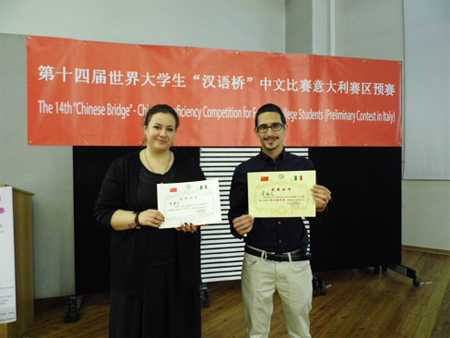
Opinion
07:27, 21-Apr-2019
My story: Italy-China bilateral ties under the umbrella of the BRI
Updated
20:04, 21-Apr-2019
Lorella Brienza

Editor's note: The second Belt and Road Forum for International Cooperation will be held in Beijing at the end of this month. Over the past six years, we have heard many voices – mostly political and economic ones – about the BRI. But we wanted to also hear from ordinary people who have experienced the BRI for themselves. Over 100 people took part in our "CGTN Belt and Road Essay Contest," and we selected the 18 best stories. Here is an essay of one of our second-prize winners. The article reflects the author's opinion, and not necessarily the views of CGTN.
Bilateral relations between China and Italy formally began only 5 decades ago; however, it is undeniable the fact that these two countries' friendship dates back to "time immemorial." Both China and Italy have always had a distinctively open and inclusive approach when it comes to sharing their cultural values with the outside world, as well as learning from other countries' best practices.
Understanding that cultural exchanges are first and foremost the basis of bilateral relations, and that no culture is by any means superior to another, is what made China's diplomatic ties so resilient throughout the years, regardless of several major changes in international geopolitics.

Lorella Brienza got a prize in the 14th "Chinese Bridge" Chinese Competition. /Courtesy of Lorella Brienza.
Lorella Brienza got a prize in the 14th "Chinese Bridge" Chinese Competition. /Courtesy of Lorella Brienza.
On its side, Italy has become aware that cultural diversity in reality stands for languages, religions and art forms, whereas it does not stand for "individuals," meaning that when it comes to people, both Chinese and Italians - especially youth - share common social values and aspirations in life.
As a matter of fact, since the ambitious Belt and Road Initiative (BRI) was launched by Chinese President Xi Jinping in 2013, Italy and other countries have "re-discovered" some of the core values that once paved the way for the Ancient Silk Road to develop.
Mutual understanding to be achieved through cultural exchanges and talent mobility, adoption of sustainable solutions for ensuring transnational security, as well as innovative yet flexible economic policies based on the people and countries' needs are just a few examples of these core values adapted to the "Xin Shidai" (New Era).
As an Italian living in Chongqing since 2015, I was able to witness first-hand how Sino-Italian cooperation has been evolving continuously and positively for both sides. Supporting evidence such as the concerted efforts and dedicated work carried out by the Consulate General of Italy in Chongqing with the local government have brought an increasing number of individuals to explore opportunities in Southwest China and several regions in Italy under the frameworks of the BRI.
Not to be missed annual events like the Italian Design Day, the Italian Culture and Cuisine Week, and the China-Italy Science, Technology and Innovation Week, just to mention a few, represent some of the conspicuous examples which brought remarkable achievements in terms of know-how exchange.
The China-Italy Chamber of Commerce on its side has also brought to the table tangible results in securing a favorable and safe investment environment for both Chinese and Italian stakeholders while highlighting the creativity of young Chinese and Italian entrepreneurs.

Lorella Brienza and her classmates. /Courtesy of Lorella Brienza.
Lorella Brienza and her classmates. /Courtesy of Lorella Brienza.
Under the guidance of the Ministry of Education, in the past 5 years Chinese universities have engaged in an astonishing number of partnerships with Italian universities. China has been giving concrete financial support to Italian students through the CSC Scholarship, whereas, Italy has been attracting an unprecedented flow of Chinese students through its Marco Polo Program.
The number of visas issued both to Chinese and Italian nationals has seen a sharp increase since the BRI was launched, and this is partly due to the work done by the Confucius Institutes in Italy and the Italian educational institutes spread across China, which have managed to revive the individuals' thirst to explore the millenarian knowledge and traditions of both countries.
The importance of allowing people from different corners of the world to understand and see with their own eyes the targets set and the results achieved so far by the BRI is fundamental in building trust among individuals; this is one of the main points stressed by President Xi Jinping during his speeches, including during his last visit to Italy in March 2019, where he exhorted leaders to join hands and work towards win-win cooperation.
In my personal view, all of the aforementioned facts should be seen as pieces of a puzzle deemed to form a larger and greater picture stretching far beyond bilateral ties, as bilateral ties are destined to become multi-lateral ties under the encompassing umbrella of the BRI, allowing all partner countries to contribute in their best capacity while integrating resources with others.
As an Italian national who has obtained her master's degree in China thanks to a CSC Scholarship and who is currently working in the field of Italian culture promotion, I cannot help but feel grateful for the chances I was given. Thus, I commit to play an active role in my community, encouraging those around me to jump on board and seize the opportunities of this New Silk Road global initiative, trusting that like-minded youth can bring positive disruptive changes in all those fields influencing people's daily well-being.
(The author is an Italian, who is now working and living in China. If you want to contribute and have specific expertise, please contact us at opinions@cgtn.com.)

SITEMAP
Copyright © 2018 CGTN. Beijing ICP prepared NO.16065310-3
Copyright © 2018 CGTN. Beijing ICP prepared NO.16065310-3